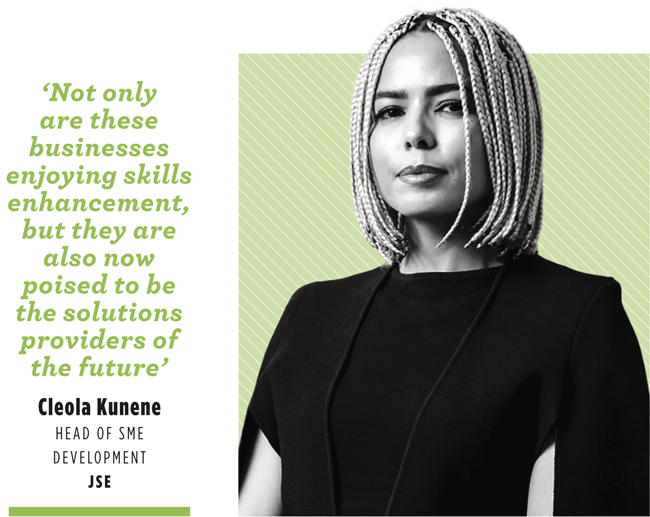There is a plethora of challenges that all businesses need to overcome in order to ensure growth. For SMEs this regime can be burdensome, difficult to navigate and time-consuming, especially given the need to scale up as quickly as possible. Without crucial foundation skills, such as understanding KPIs, how to access funding, meeting compliance demands and so on, the cycle time to acquire such skills can be long and costly, and more so at a time when the SMEs are primed for growth.
The JSE stepped in two years ago with the introduction of the free JSE Enterprise Acceleration programme, designed to fast-track the development and ensure the sustainability of SMEs. This initiative is aligned to the JSE’s overarching commitment to support SMEs in areas such as supplier development, new capital-matching solutions, driving policy reform, ESG and incubator solutions.
Cleola Kunene, Head of SME Development at the JSE, explains how the JSE Enterprise Acceleration programme is structured. ‘It’s an intense ecosystem of advisers, mentors, educational enablers and network programmes that enable entrepreneurs to focus on at least two to three of their identified key performance indicators, while working through a combination of individual mentoring and structured group sessions. There is also a strong focus on scaling, capital and funding requirements, and operations.’
The host, mentors and advisers are sourced from the JSE’s credible network of partnerships – some 15 of them – that share the same vision, that being to support SA’s national economic development agenda, of which SME growth is highlighted as one of the catalysts. One of the side benefits, says Kunene, ‘is that on completion of the programme, participating SMEs can be absorbed into the ecosystem and, in turn, begin to uplift their SME peers’.
Qualifying SMEs are those with a turnover of at least R20 million; have been operating for a minimum of two years; are founder-led SA businesses; and are focused on diversity – be that gender equality or BEE. They need not be listed companies but they must prove high-growth prospects and have clearly defined capital-raising needs. ‘These targets are quantified by our in-depth analysis of each successful applicant SME, whereby we can identify areas that need support and their requirements for funding readiness,’ she says. ‘We then appoint a specific adviser and/or mentor to the SME and provide the masterclasses and investor-readiness solutions.’
Beyond the JSE Enterprise Acceleration programme, the exchange has introduced a number of additional solutions for smaller business, from speed coaching with world-class leaders in their field, to capital-readiness solutions. Speed coaching entails live YouTube sessions, with a new topic tackled every month. Capital readiness offers everything from funding webinars and direct-pitch readiness guidance, to advisory services.
‘Access to finance is challenging, but the gap between what funders want and the SMEs seeking funding is not being meaningfully addressed,’ says Kunene. ‘Our aim is to help companies so that they can fast track their funding readiness.’ To date, 16 companies have completed the programme and 15 are currently participating. Applications for 2023 are open.
‘The response is better than expected, which is why the acceleration programme is designed to evolve as demand heightens. The results to date have been exceptionally positive, with the companies achieving growth of between 15% and 150%, increasing their employment by at least 40% and raising over R1 billion collectively. Companies have also grown in the US, UK and across Africa,’ says Kunene.
‘We’ve also seen an increase in the number of mentors from the JSE partner network that have donated their time and sharing of knowledge,’ she adds. ‘There is no doubt this programme is a game-changer for SMEs and economic development. Not only are these businesses enjoying skills enhancement, but they are also now poised to be the solutions providers of the future.’









